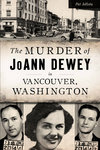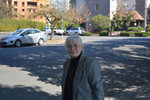

When Arcadia Publishing & the History Press asked Pat Jollota to write about a crime in her hometown of Vancouver, she began to remember the bizarre circumstances surrounding the JoAnn Dewey murder in 1950 and decided to take it on.
“This crime fascinated me. It really did,” Jollota said. “I was curator at the Heritage Museum. When I had nothing else to do, I would read the old newspapers and I came upon this story. My husband was a homicide detective and I worked for the LAPD for 22 years, and I couldn’t figure out what the heck was going on.”
Jollota, 81, wrote her first book in 1993. It was called “Naming Clark County.” She revised the book 10 years later. She also wrote “Darkness Next Door,” which is about ghost stories in Clark County.
“The stories allow me to tell history,” Jollota said. “If you just sit down and talk history, nobody wants to hear it. But if you tie a ghost into it, they’ll listen. Or a murder.”
For “The Murder of JoAnn Dewey in Vancouver, Washington,” Jollota began by trying to decipher three different stories. The investigation itself included a tug of war between the newly elected sheriff, who was holding press conferences to share his theories, and the police chief, who was going through the evidence step by step.
“There was the story of the murder itself, the story of the trial and the story of the investigation,” Jollota said. “And then this whole political thing with the Democrats and the Republicans and the election and all of that, and trying to weave all these stories together.”
Although the suspects maintained their innocence, a single piece of evidence kept pinning them back at the scene of the crime — a beer bottle.
“Without the beer bottle, they never would have solved the case,” Jollota said.
She added that Erle Stanley Gardner, author of the Perry Mason series, said “that beer bottle was irrefutable evidence.” Gardner and his group of retired FBI agents reviewed the case during its final appeal. This became known as the “Court of Last Resort.”
The Wilsons were hanged in Walla Walla just after the New Year, in 1953. According to Jollota, Walla Walla follows the US Army’s manual for executions.
“The Army has a manual for how to hang somebody,” she said.
By tracking down the Walla Walla newspapers, Jollota discovered that they dressed the brothers in new suits and built a double gallows with a black curtain between the two.
“The witnesses were in the
floor below so they could drop down in front of them,” she said.
Jollota doesn’t end the book with the execution. There’s also the aftermath. She wanted to write about what happened to the sheriff, the police chief and the families of the victim and the murderers.
“Murder is the ultimate theft,” Jollota said. “You’ve stolen not only one person’s life, you’ve stolen that person from their family and friends and their community. It’s the ultimate theft.
“And it ripples. Murder ripples through the community every time. That’s what I wanted to show in this aftermath; that murders ripple,” she added. “People say you get closer. No, you never get closure. Very often when people are calling for justice, what they really want is revenge. That’s what they’re really after is revenge, and you’re just not going to get it.”